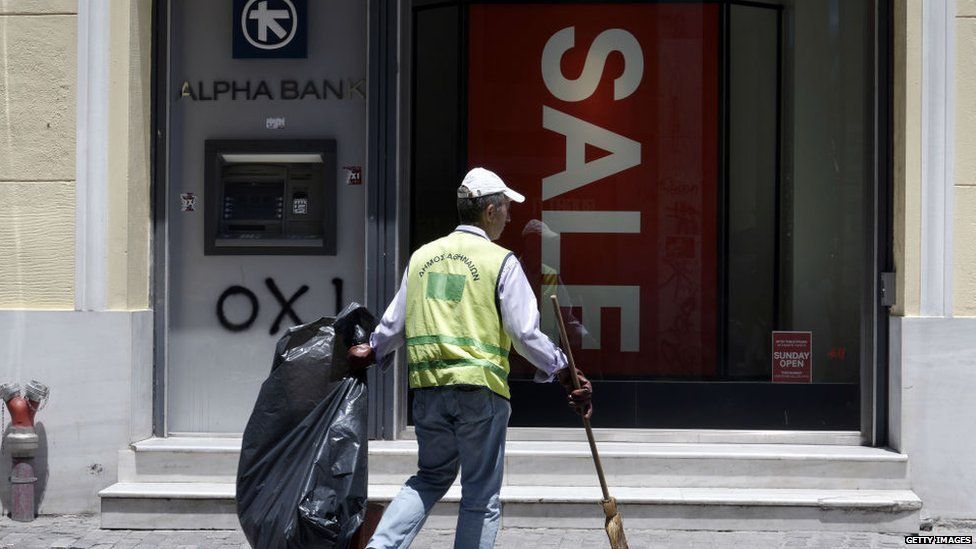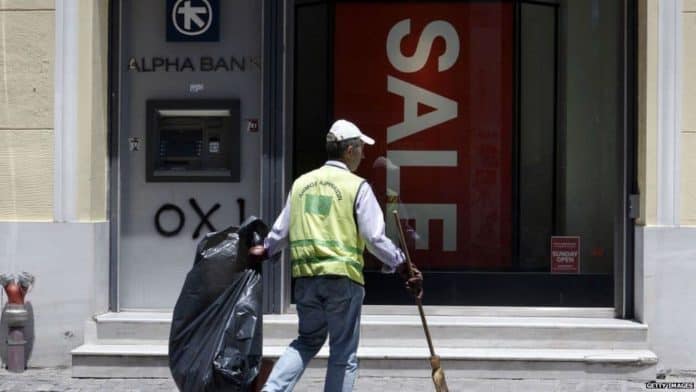-
17 July 2015
- From the section Europe

Greece and its creditors can formally start talks on the country’s third bailout after the necessary eurozone parliaments gave their backing.
The final approval came from the German parliament after an impassioned and at times ill-tempered debate.
A €7bn (£5bn) bridging loan has also been confirmed for Monday, when Greece has big debt repayments to make.
The head of the Eurogroup said there was now a chance to get the Greek economy back on track.
But Jeroen Dijsselbloem warned that the process would not be easy, saying he expected the negotiations to take four weeks.
The German parliament voted in favour of starting the talks on Greece’s €86bn (£60bn) bailout deal, with 439 MPs in favour, 119 votes against and 40 abstentions.
Prior to the vote, Chancellor Angela Merkel warned of “predictable chaos” if the Bundestag did not back the plan.
Approval
The Greek parliament has already voted in favour of accepting the hard-hitting austerity measures required by the eurozone for a third bailout deal.
On Thursday, the European Central Bank (ECB) raised the level of emergency funding available. This has paved the way for Greek banks, which shut nearly three weeks ago, to reopen on Monday.
But credit controls limiting cash withdrawals to €60 a day will only be eased gradually, officials say.
The eurozone’s bailout fund, the ESM, announced it would formally open negotiations on a third bailout programme on Friday after both the Austrian and German parliaments voted in favour of negotiations.
They were the last of several eurozone states needing to give parliamentary approval for the bailout talks to get under way. France and Finland had already backed the negotiations.
Separately on Friday, the European Council approved the €7bn bridging loan for Greece from an EU-wide emergency fund. The loan was approved in principle by eurozone ministers on Thursday and now has the go-ahead from all non-euro states.
It means Greece will now be able to repay debts to two of its creditors, the ECB and International Monetary Fund (IMF), due on Monday.
What happens next? Chris Morris, BBC News, Brussels
So Greece and the eurozone now need to negotiate all the details of a new bailout, get it approved in several parliaments, and then disburse the money – all before 20 August.
That’s when another big debt repayment to the ECB is due – and the short-term funding for Greece that’s been agreed this week will have long gone by then.
It’s a tight timetable when you look at how previous bailout negotiations have gone, and especially when you consider the months of fruitless talks Greece and its creditors had in the first half of this year.
But there’s pressure on all sides to do this quickly: not least because the Greek economy – and the banking system in particular – is in such a precarious position.
Without a deal, another chunk of short-term funding would have to be found from somewhere – and officials would like to avoid that if they can.
But Valdis Dombrovskis – the commissioner in charge of the euro – has suggested that debt sustainability will have to be part of the negotiations because “this is something the IMF insists on”.
And if he means that serious discussions on debt need to start straight away, that will add another layer of complexity and take up precious time.
Busy birthday for Angela Merkel
Meanwhile, there have been fresh calls for Greek debt relief measures from IMF chief Christine Lagarde – echoing a call from Greek PM Alexis Tsipras.
Ms Lagarde told France’s Europe 1 the IMF would participate in a “complete” Greek package that includes debt restructuring, as well as an “in-depth reform” of the Greek economy.
Withdrawal limit
Greece has debts of €320bn and last month became the first developed country to fail to make a repayment on a loan from the IMF.
The bank closures have been one of the most visible signs of the crisis. From Monday, a weekly limit on withdrawals may replace a daily cap, Greek Deputy Finance Minister Dimitris Mardas suggested.
Meanwhile a rise in value added tax (VAT) – one of the reforms required for the bailout talks – will kick in on Monday. Rates will go up from 13% to 23% on items such as food and drink in restaurants, taxi fares, selected supermarket goods, public transport and plane and ferry tickets.
Greek Prime Minister Alexis Tsipras is widely expected to announce a cabinet reshuffle after facing opposition from within his left-wing Syriza party over measures demanded for the bailout talks to start.

